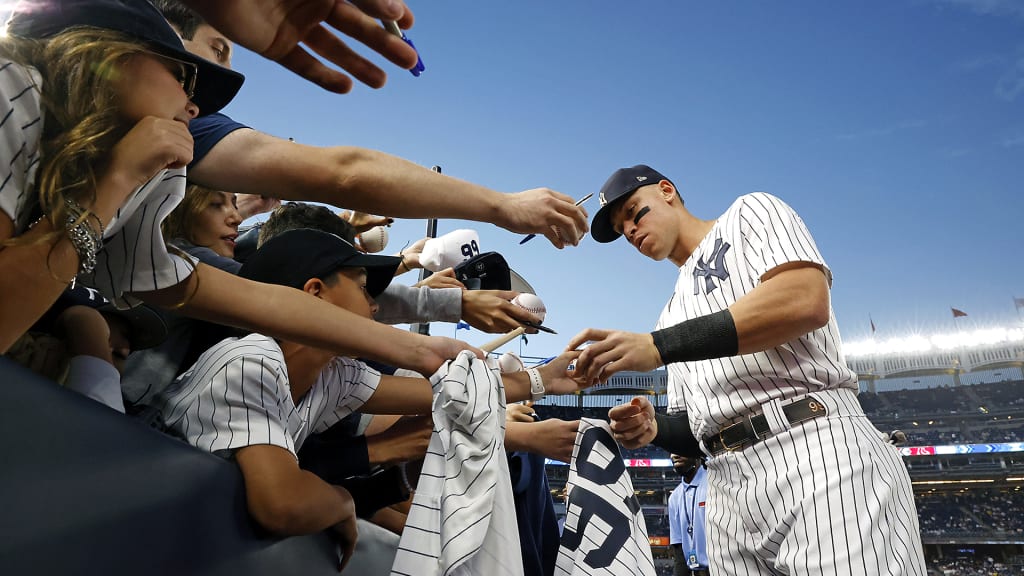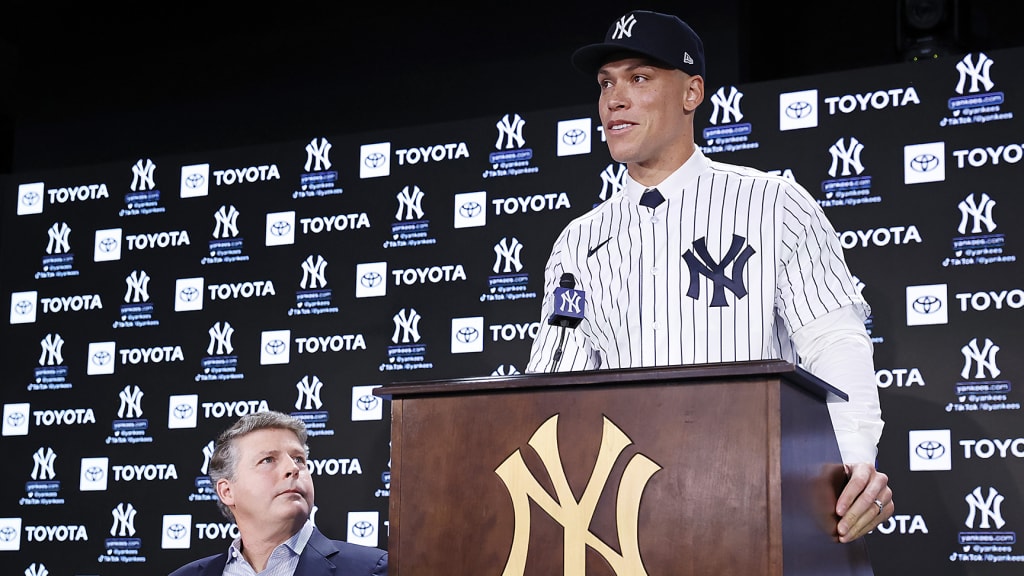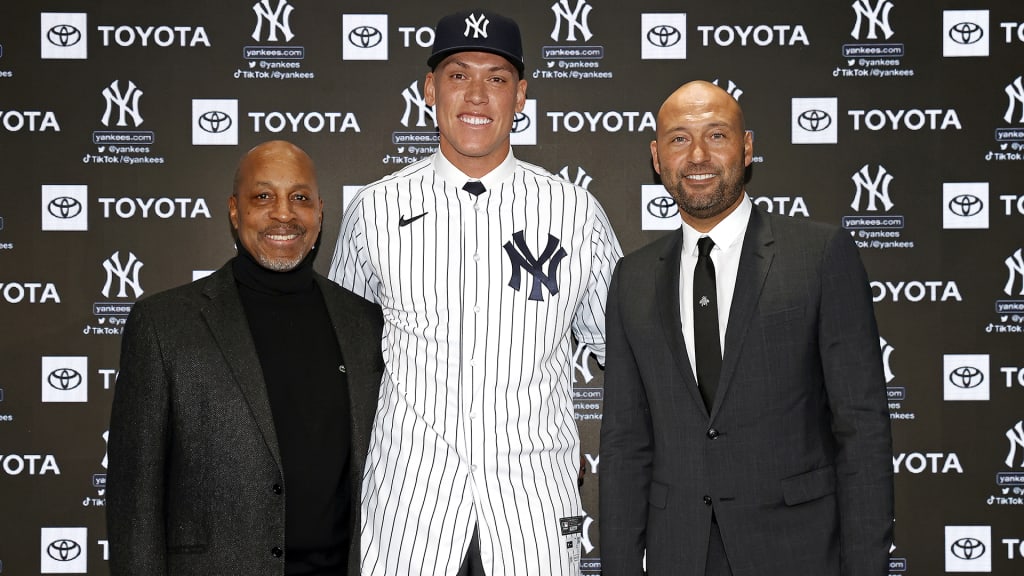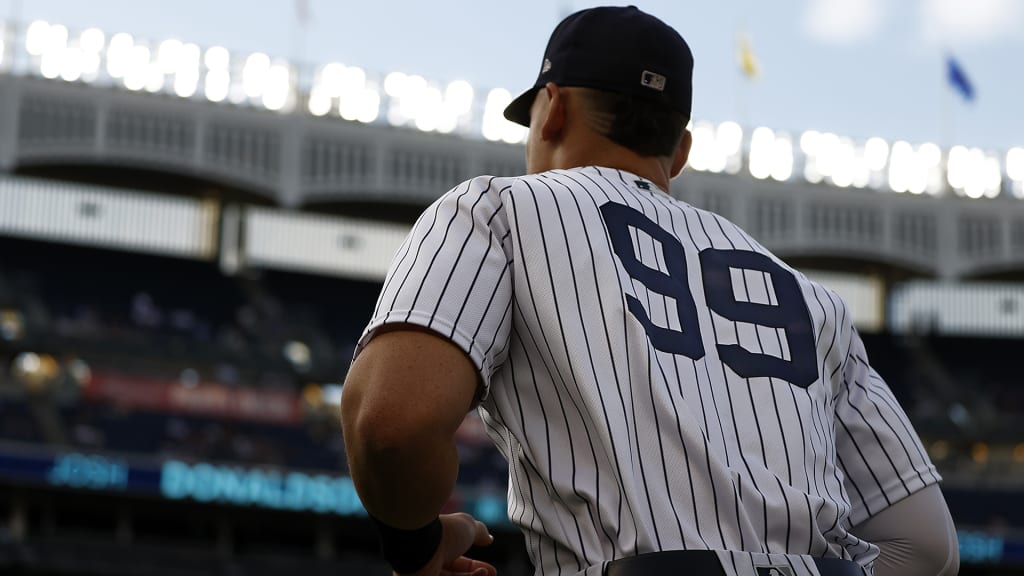
If you watch a person over time, you can pick up on certain tendencies: habits that they fall into, predilections they revert to. Aaron Judge has, with good cause, stood and spoken before countless watchful reporters in his first seven seasons in pinstripes. And now with a new nine-year deal that will likely see him remain a Yankee for his entire career, writers covering the star slugger will have ample opportunity to pick up on a verbal inclination that is at once noble and notable, but can also come across as more than a bit unusual.
There’s a deference that comes naturally to this hulking baseball superhero, a reliance on spreading around the credit whenever Ol’ Blue Eyes starts spreading the news. After all, it was Judge who hit 62 home runs last year, an American League record, but based on his postgame pressers, he’d have you believe each one was an accomplishment split 26 ways. Baseball -- a team sport made up of so many individual battles -- has few moments more singularly realized than the home run trot, yet Judge insisted, on what seemed like a nightly basis, that every longball was somehow launched by committee.
To some fans’ ears, it may seem a bit absurd. It also may well be why Aaron Judge is now the 16th captain in New York Yankees history, joining one of sports’ most exclusive fraternities while formally assuming a role he has long embodied.
As he stood at the podium this past December, not long after signing his name to the most lucrative contract in franchise history, Judge flashed the smile so familiar to fans, teammates, coaches and even opponents. Everyone has seen it by now, a joyful, semi-withdrawn chuckle of a grin, at once “Aww, shucks” and “Oh, yeah!” It took just a sentence and a half before that preposterous humility emerged once more, as he thanked the Steinbrenner family for making him a Yankee.
“All the way back in 2013,” Judge said, his No. 99 jersey having replaced an immaculately tailored suit jacket, “you believed in my ability, a little kid out of Fresno State to the Big Apple.”
Aaron Judge is a lot of things. He’s a bona fide superstar on the world’s biggest stage. He’s the American League single-season home run champ. He’s ticketed for a career spent entirely with the New York Yankees, someday memorialized in Monument Park and perhaps even Cooperstown.
What he is not -- not now, presumably not in a very long time -- is little.
He has been a force on the field for the Yankees since his very first plate appearance in 2016, and a leader behind the scenes for almost as long. He is extraordinary, yet, oxymoronically, reliably so. His output should be unfathomable, but for the fact that he just keeps on doing it. He is, to put it short, a player whose lead you have no choice but to follow, yet also someone with a remarkably natural modesty. If it seems hard to keep those two traits in balance, you’ll just have to trust everyone who has played with him. Judge makes it work.
New York fans and players can look forward to nine more years of watching No. 99 ply his craft as remarkably as anyone the sport has seen in recent memory. The goal, no matter whom you ask, is championships, plural, as regular as they were during the careers of Judge’s forebears, captains such as Derek Jeter or Thurman Munson or Lou Gehrig. The process, though? Ideally, that should remain the same, with Judge serving the same role in the same way he has for the past six years. Once unofficial, now codified, the team’s newest captain is ready as ever to humbly go where so many Yankees teams have gone before.
“The minute I got drafted until now,” Judge said, “it’s been about bringing a championship to New York.”

***
The great ones can make a stadium explode in jubilant noise. But it takes a true legend to make that same mass of humanity go completely silent.
It was one of the most surreal parts of the whole magical 2022 home run barrage. In those last games at Yankee Stadium, each Aaron Judge at-bat featured a heavy, crushing silence just as the pitch was thrown. With bated breath, fans held their iPhones steady, trying to record history, too nervous to make a sound. The Bronx ballpark opened in 2009 and, just seven months later, hosted a World Series championship clincher. That spectacle had nothing on the suspense of Judge’s pressure-packed plate appearances late last September.
So as Judge sat down at Yankee Stadium in December to sign his new contract and noted that the room had gotten quiet and tense, general manager Brian Cashman joked that it reminded him of those September at-bats. The anticipatory weight of emotion in the room was befitting of the moment.
This baseball era too commonly tries to separate teams and executives into hard and soft analysts. The Yankees maintain an exceptionally robust data analytics department, and it’s not uncommon to hear some less–numerically inclined fans bemoan the lack of emotion at play in baseball decisions, misguided though the assessment may be. But in the case of the Judge contract, Cashman was perfectly clear that it was more than a baseball deal. Judge is the guy you can’t let get away.
“This is a franchise player,” Cashman said during the press conference. “This is not just a baseball situation. You’re talking about someone that people stop doing what they’re doing and watch every at-bat.”
Indeed, the offseason was barely a few days old when Hal Steinbrenner invited Judge to his Tampa home for the first of several chats that would eventually end with a new contract and the captaincy. The Yankees’ managing general partner wasn’t shy about his intentions.
“It was difficult to imagine the Yankees without Aaron,” Steinbrenner said.
Over the next few weeks, matters played out between Cashman and Judge’s representatives, but as negotiations seemed to be nearing an end, Steinbrenner took a break from an Italian vacation to phone Judge again, insistent on manifesting one crucial belief: “I told him, ‘You’re not a free agent. As far as I’m concerned, you’re a Yankee.’”
That confidence, along with a hefty raise, will get you your franchise outfielder. It helped, of course, that Steinbrenner had a willing partner across the table.
“I could have gone through free agency in two days,” Judge said. “I would have just talked to him twice and wrapped everything up.”
In reality, the process was a bit more drawn out. The hang-up, to the extent there was one, was that Judge coveted a ninth year. In the interim, the player who had only ever known Yankees pinstripes got to meet with other teams, hear their sales pitches and see their visions for the future.
The meetings were impressive, and the offers potentially life-changing, as was the opportunity to play closer to his childhood home in Northern California. But they also helped reaffirm Judge’s stated position that he wanted to remain a Yankee. Once the ninth year was on the table from New York, it was easy to shake hands (at least across a phone connection) and look to the future.
“Ultimately,” Judge said, “going back to thinking about my teammates, thinking about the unfinished business, thinking about where my family will be comfortable for the next nine years and the rest of my career -- New York checked every single box for that.”
In the end, Judge and his wife, Samantha, had flown out to California, a short stopover before heading to Hawaii to celebrate their first anniversary. He landed in the middle of the night and saw he had missed a call from Steinbrenner. The endgame was at hand.
“I got in about 2:30, made the phone call at 3 and I was a Yankee at 3:30,” Judge said.

***
There’s obviously something special about any big-time free-agent signing. The celebrations welcoming Gerrit Cole to town in late 2019 and Carlos Rodón the day after the Aaron Judge party were certainly among the best days of long offseasons for Yankees fans.
It’s different when you’re keeping a guy, though -- particularly when it’s someone as integral to ... everything ... as Judge is to the Yankees. The day before he and Steinbrenner came to terms, rumors and a misguided tweet from a well-connected baseball reporter had Judge signing with San Francisco. For Yankees manager Aaron Boone, the thought of his star’s impending departure hit like a fastball to the ribcage. Hours later, though, Judge was a Yankee again. Boone described the roller-coaster ordeal as “that feeling if you lost your cell phone, your keys, your wallet and your iPad. Gone. And the next morning, someone knocks on the door and says, ‘Were you looking for this?’”
The manager was positively giddy during the press conference, conveying at length just what Judge has meant to everyone associated with the organization. But like so many who know the slugger best, Boone was sure to point out that beneath the kind veneer, behind that youthful chuckle every time he smiles, putting aside the remarkably good-natured way that he interacts with young fans before every game, the outfielder possesses a killer instinct that has served him well, a trait that Boone remembers seeing from one of the guests on the dais, Yankees legend Derek Jeter.
“Between the lines,” Boone said, “like many of the great ones, like the guy down there toward the end of the table, they’re coming to rip your heart out. They’re playing this game with an edge and with a swagger, and that’s another thing that I love about Aaron Judge. … Every now and then, he’ll give me a look, or say something to me like, ‘I got you today.’”
There’s a reliability there. The greats can be counted on. Aaron Judge isn’t going to hit a home run every day, and he’s not going to make every single play. But he’ll always be impactful. He’ll show up ready to compete. His presence alone will make lineups more threatening, make pitchers work harder, make mistakes more painful.
You almost take it for granted. During those final at-bats in the Bronx last year, as Judge chased Roger Maris’ record, fans would, hilariously, groan if he doubled. Who could blame them? When you buy a ticket to witness greatness, you expect every song to be an 11 o’clock aria that brings the house down. We assess the icons differently. And, in turn, the legends use that to up their own game.
“All my blood, sweat and tears have gone into this one thing, which is to play for this team and play for this city and these fans,” Judge said. “And knowing that I get to continue to do that, and do it in one city, words really can’t describe it. It’s such an incredible feeling. It’s family, you know? The fans are family.”
And even if we all want to see baseball’s best talents sign, develop, star and retire with the same team, it’s somewhat outdated in today’s industry. Not all teams can pull it off, and not all players even want them to. As Cashman pointed out, it’s all well and good to want to make a guy a lifelong Yankee, but that feeling needs to be mutual.
Sometimes, though, it is meant to be.
“Look at Jeter,” says another Yankees legend, Don Mattingly, the team’s 14th captain. “It wouldn’t look right to see him anywhere else, right? And nine years from now, it probably wouldn’t look right that Aaron’s anywhere else. So, I think certain guys, it happens. It doesn’t happen very often, but it’s pretty cool when it does.”
Cashman and Steinbrenner wanted it. Thankfully, so did the other party. “We belong in New York,” Judge said. “We belong in this city. There’s a lot of unfinished business here in New York.”

***
We see baseball players so much -- every day, about seven or eight months a year -- that we think we understand them a bit better than we actually do. Sometimes, it takes one to know one. So, what does Derek Jeter -- the previous Yankees captain, a man equipped with a die-trying insistence on greatness, a guy who viewed any season that didn’t end in a parade as a failure -- remember about first encountering Aaron Judge?
“He’s big,” Jeter recalls thinking. “The size was the first thing that stood out. Everyone that camp was kind of watching. You don’t want to say too much. But you can tell he was respectful. You can tell when people are attentive, paying attention and stuff. Sometimes you’ve seen people just go through the motions, but you could tell that he was listening.”
It wasn’t long before Judge was drawing comparisons to Jeter. There’s just something in the way that he has carried himself, his presence in the clubhouse. From early in his career, Judge knew how to play the game that exists on the periphery of the actual game.
“He understands the responsibility, not just of representing himself and his family, but the organization and his teammates,” says Willie Randolph, who served as co-captain with Ron Guidry from 1986 to ’88.
It’s an ethos that cuts to the heart of who Judge really is. The guy can deflect praise like an elite goalkeeper. But rest assured, Judge says, “I believe in my abilities and what I’m capable of.”
“I think great players understand that it’s not just about them,” Randolph says. “That no matter how great you are, no matter how many numbers you put up, that ultimately, if your teammates are not following your lead or your example, then, yeah, you might end up being a great player or whatever, but you’re not going to get to where you really need to go.
“I’m not a guy that throws that word ‘great’ around very loosely. There’s nothing wrong with being really, really good. I don’t think that we should throw around greatness too easily, but you can see it materializing. I think Aaron understands that no matter what kind of year you might have, you need to be consistent. You have to post up every year with that ‘I want to win and be a champion’ attitude. And I think that’s something that the great ones understand. I saw that in Don Mattingly at a young age. You can tell it right away, that they belong. You can tell that they understand what it takes. You understand that they are all about winning, no matter what their stats say, or how great the people say they are.”
Jeter has five rings. He’s the avatar of New York baseball greatness for a couple generations of fans. But the recent seven-part ESPN documentary about his career and life wasn’t called The Champion. It was called The Captain. There’s meat to the title, a deep-seated meaning that goes back more than a century. There have been 1,759 Yankees in the team’s first 120 years, but just 16 captains. Hal Steinbrenner didn’t even mention the captaincy in the back-and-forth with Judge before the agreement. To use the honor like a pawn in negotiations, he said, would be disrespectful.
There’s no doubt that Jeter, like Judge, has a healthy belief in his abilities. He more than earned it. But he also knew how to get the most from the guys around him, to be the rising tide. He knew that sometimes being the leader meant falling in line. If it sometimes seemed a bit cheeky or even odd to hear Jeter call his manager “Mr. Torre,” well, it’s not that different from hearing Judge describe himself as a “little kid out of Fresno State.”
“He doesn’t really like talking about himself,” Guidry says, comparing Judge to Jeter. “‘Look, I’m part of this engine that runs. It’s running well. Let’s just keep it oiled, and we’ll keep moving forward.’ He doesn’t say anything about him being a cylinder who’s running overtime or doing anything else.”
The thing about the captaincy of the New York Yankees is that it’s not about what you have done, and it’s not about what you will do. It’s who you are. Judge enters 2023 with a new title, but you’d be crazy to expect anything about him to change.
“Ever since I stepped foot in the Yankees’ clubhouse, that guy was the captain, to me,” catcher Jose Trevino, who arrived toward the end of spring training last year, said during a workout in San Antonio this past January. “And no disrespect to any of my other teammates that I’ve ever played with -- I’m talking from when I was in tee ball to now -- Aaron Judge is one of the most impressive human beings that I’ve met. I’m not even talking about the player, this is just him being a leader, him being himself throughout the clubhouse.
“That’s why I’m here every day. Because not only do I want to win a World Series, but I want to win a World Series for him.”
Judge, like Trevino, was an All-Star last year. Like the catcher, Judge is a beloved teammate who is adored by many fans. Both players’ 2022 seasons were the best of their careers to date. But it’s no kind of knock on Trevino to say that Judge -- however hard he tries to equate his fellow Bombers’ contributions to his own -- is on a different plane right now. It’s not about living up to a title. It’s about a title that matches everything about Aaron Judge’s character.
“I want to build something that this next generation of Yankee greats and Yankee players, they’ll be the next ones taking this torch and ultimately leading what this Yankee franchise is all about,” the Yankees’ captain said about the baton passed to him by Jeter on a celebratory December morning. “Which is winning. And that’s what Derek and Mattingly and Thurman Munson and all those guys before us did.
“I hope someday, whenever the next Yankee captain comes aboard, that I’ll have a chance to be sitting right there next to him and congratulating him and have a great relationship with him. And let him do his thing.”